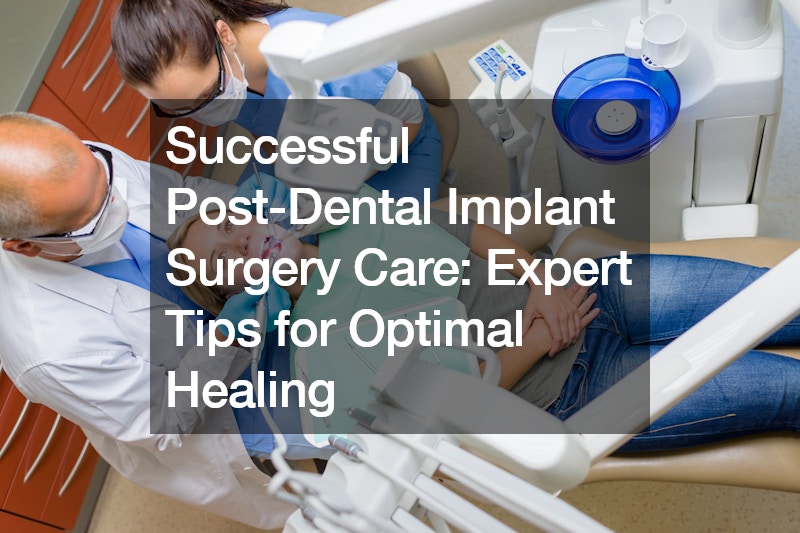

Dental implant surgery marks a significant step towards achieving a healthy, functional smile. However, the success of the procedure depends not only on the surgical skill but also on the post-operative care provided. In the following guide, we’ll delve into expert tips for optimal healing following dental implant surgery.
Maintain Low Heart Rate for Controlled Bleeding
In the initial 24 to 48 hours post-surgery, it’s crucial to keep your heart rate low. This means refraining from strenuous activities such as vigorous exercise or heavy lifting. Elevated heart rate can lead to increased blood flow, which may disrupt the formation of blood clots necessary for proper healing. Instead, opt for gentle activities like leisurely walks to promote circulation without putting undue stress on the surgical site.
Mind Your Temperature Intake
While still experiencing numbness from the surgery, be cautious with hot beverages or foods. The lack of sensation may prevent you from realizing when something is too hot, potentially leading to burns or tissue damage. Similarly, extreme cold should also be avoided, as it can cause discomfort and sensitivity. Stick to lukewarm or room temperature items to prevent any adverse reactions.
Avoid Smoking and Suction
Smoking is detrimental to healing after dental surgery, including dental implant procedures. The chemicals in cigarettes can impede blood flow and compromise the body’s ability to heal efficiently. Additionally, refrain from using straws or engaging in activities that involve suction, such as drinking through a straw or smoking. Suction can dislodge the blood clot that forms over the surgical site, leading to complications like dry socket and delayed healing.
Hands Off Approach
Resist the urge to touch or manipulate the surgical site with your fingers or tongue. Even though it may be tempting to explore or check on the area, doing so can disrupt the healing process and increase the risk of infection. Let the body’s natural healing mechanisms work undisturbed by avoiding unnecessary contact with the surgical site.
Follow Antibiotic Regimen
In many cases, antibiotics are prescribed after dental implant surgery to prevent infection and promote healing. It’s essential to adhere to the prescribed antibiotic regimen as directed by your dental care provider. Completing the full course of antibiotics helps to ensure that any potential infection is effectively treated, reducing the risk of complications and supporting optimal healing.
Soft Diet and Gentle Rinsing
Following dental implant surgery, stick to a soft diet to minimize discomfort and reduce the risk of irritation to the surgical site. Avoid hard or crunchy foods that could potentially damage the delicate tissues surrounding the implant. Additionally, gentle rinsing with warm salt water can help to keep the area clean and promote healing. Be sure to rinse gently to avoid dislodging any blood clots or sutures.
Schedule Follow-Up Appointments
Regular follow-up appointments with your dental care provider are essential for monitoring your progress and addressing any concerns or questions you may have. These appointments allow your dentist to assess the healing process and make any necessary adjustments to your treatment plan. It’s essential to attend all scheduled follow-up appointments to ensure the best possible outcome for your dental implant surgery.
Manage Pain and Discomfort
While some discomfort is normal after dental implant surgery, it’s essential to manage pain effectively to support healing and improve your overall comfort. Your dental care provider may prescribe pain medication or recommend over-the-counter pain relievers to help alleviate any discomfort. Additionally, applying ice packs to the outside of your face can help reduce swelling and numb the area, providing relief from pain.
Maintain Proper Oral Hygiene
Although you’ll need to be gentle around the surgical site, it’s still essential to maintain proper oral hygiene to prevent infection and promote healing. Your dentist may provide specific instructions for cleaning around the implant site, such as using a soft-bristled toothbrush or special oral rinse. Follow these instructions carefully to keep your mouth clean and healthy during the healing process.
Monitor for Signs of Complications
While most patients recover smoothly from dental implant surgery, it’s essential to be vigilant for any signs of complications. Contact your dental care provider immediately if you experience excessive bleeding, persistent pain, swelling, or signs of infection such as fever or foul odor. Prompt treatment of complications can help prevent further problems and support optimal healing.
In conclusion, successful healing after dental implant surgery requires careful attention to post-operative care. By following these expert tips, you can support optimal healing and enjoy the benefits of your dental implants for years to come. Remember to prioritize rest, avoid activities that may disrupt healing, and follow your dentist’s instructions closely for the best results. With proper care and attention, you’ll soon be enjoying a beautiful, healthy smile.
.



